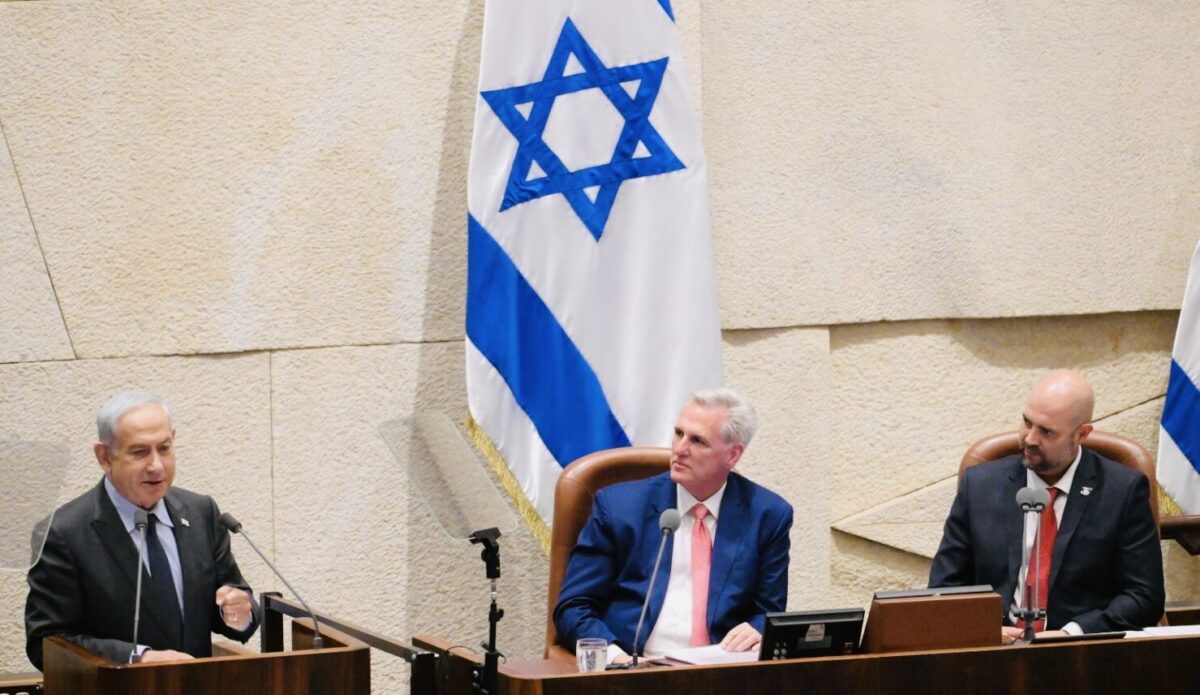Trips by two high-ranking Republican politicians to Israel in the past week add credence to a recent Gallup survey that Republicans in the United States are more likely to support Israel than Democrats.
Kevin McCarthy, the Republican Speaker of the House of Representatives, and Ron DeSantis, the Republican governor of Florida and a likely contender for his party’s presidential nomination, visited Israel recently and spoke glowingly of the Jewish state and its relations with the United States.
Their public comments, in effect, substantiated the findings of a Gallup poll, which was released in mid-March.
For the first time, Democrats were more sympathetic to the Palestinian cause than Israel. Forty nine percent of Democrats said they sympathized with the Palestinians, while 38 percent said they sided with Israel.
By comparison, 78 percent of Republicans said they were pro-Israel, while 11 percent said they favored the Palestinians.
On the whole, U.S. public opinion is still more favorable to Israel, a major U.S. ally in the Middle East, says Gallup. Fifty four percent of Americans are pro-Israel and 31 percent are pro-Palestinian.
In conclusion, the Gallup poll authors noted, “Americans’ views on the Palestinian-Israeli conflict have become more polarized as Democrats increasingly commiserate with the Palestinians, while Republicans maintain their solid alignment with the Israelis.”
Democrats, particularly those in the progressive wing, have been increasingly critical of Israel due to its military occupation of the West Bank and the Israeli government’s opposition to a two-state solution. Most Republicans perceive the West Bank as “disputed” territory. Nor do they necessarily endorse Palestinian statehood.
It is abundantly clear that Israel has alienated many liberals and morphed into the darling of conservatives, not only in the United States but in Canada, Europe and Asia as well.
This represents a quantum shift in attitudes toward Israel. During its first years of existence, Israel was far more popular among Democrats than Republicans, judging by the policies of a succession of U.S. presidents.
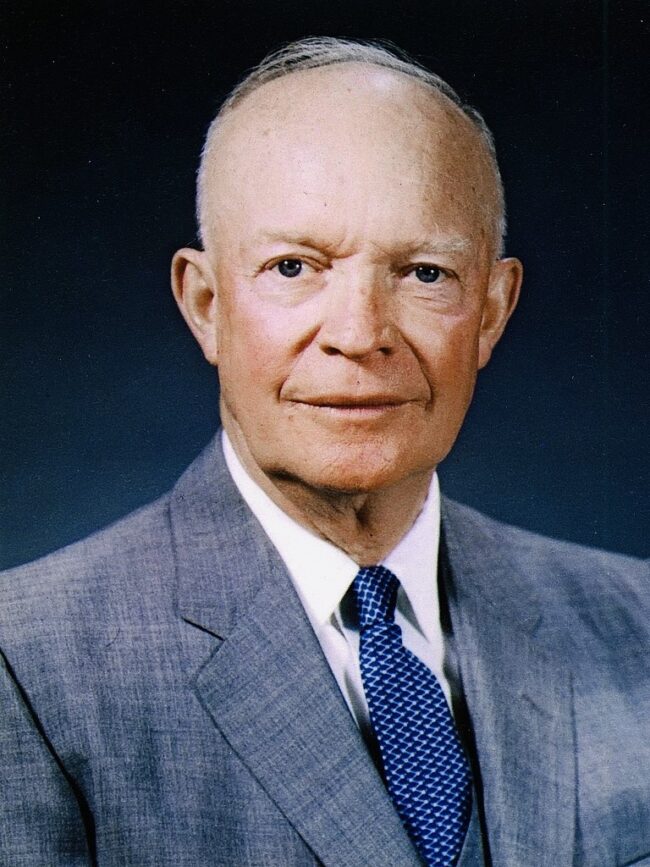
Harry Truman, a Democrat, recognized Israel in 1948 only minutes after David Ben-Gurion, its first prime minister, declared statehood. Dwight D. Eisenhower, a Republican, temporarily cut U.S. economic aid to Israel and forced Israel to withdraw from the Sinai Peninsula in 1956. John F. Kennedy, a Democrat, revoked the U.S. arms embargo against Israel, but called for the return of Palestinian refugees to Israel. Lyndon Baines Johnson, a Democrat, took the leading in forming an alliance with Israel in the wake of the Six Day War.
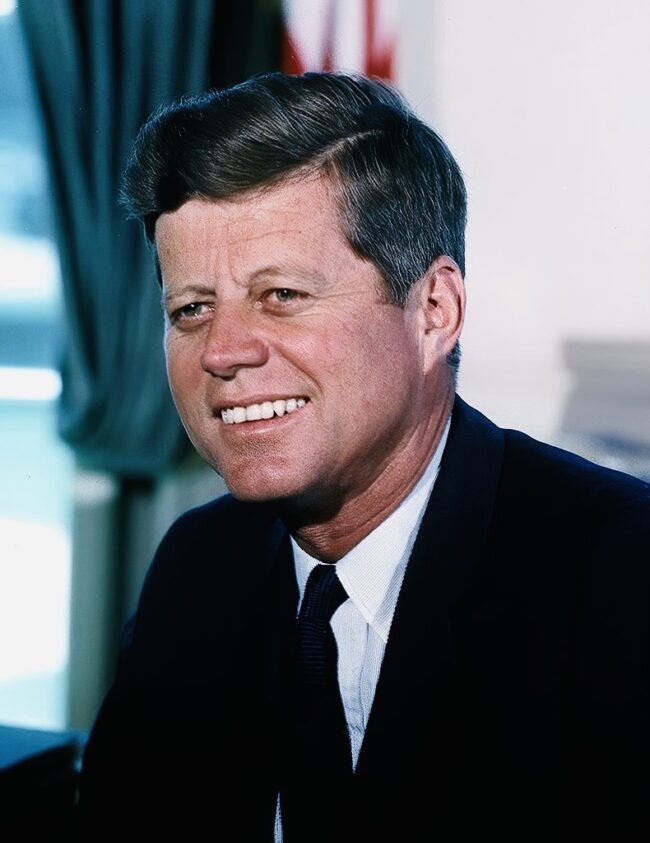
Richard M. Nixon was the first Republican president to regard Israel as a strategic asset. During the Yom Kippur War, he replenished Israel’s dwindling stock of weapons in an emergency airlift. Nixon’s successors, notably Ronald Reagan, George W. Bush and especially Donald Trump, carried on his legacy.
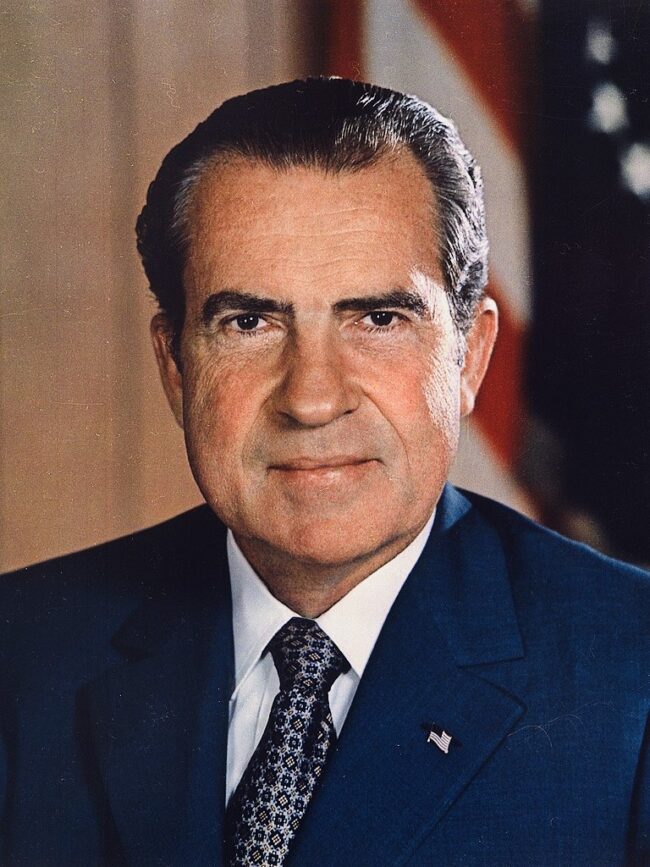
McCarthy and DeSantis visited Israel during Israel’s 75th anniversary of statehood as this ideological sea change has taken hold in the Republican Party.
They arrived shortly after Republican Senator Lindsey Graham, a keen supporter of Israel, met Prime Minister Benjamin Netanyahu in Jerusalem to discuss the prospect of a normalization agreement between Israel and Saudi Arabia.
McCarthy, in his first trip abroad since becoming Speaker in January, touched down in Israel on April 30 for a two-day visit following a whirlwind trip to Jordan. He was accompanied by a bipartisan delegation.

Following a visit to Yad Vashem, the Holocaust memorial in Jerusalem, they were treated to a festive reception by the Speaker of the Knesset, Amir Ohana, who surprised McCarthy, a Californian, by playing the hit song, Hotel California, on an electric guitar.
Subsequently, McCarthy met Prime Minister Benjamin Netanyahu and President Isaac Herzog.

In a speech at the Knesset, the first by an American Speaker of the House of Representatives since 1998, McCarthy lauded Israel as the birthplace of the Jewish people, praised it as a “modern miracle,” and declared its right to self-defence.
McCarthy, in a reference to Iran, a common foe and Israel’s deadliest enemy, said, “The resources we provide to the friendship with Israel make the world safer … We can never allow Iran to have a nuclear weapon.”
Prior to addressing the Knesset, McCarthy described Israel as a “blessed nation,” noted that the United States has “no greater ally” than Israel, and denounced Iranian aggression in the Middle East.
McCarthy, in a rebuke to U.S. President Joe Biden, said he would invite Netanyahu to Washington if he does not receive a formal invitation from the White House in the near future. “If (it) doesn’t happen, I’ll invite the prime minister to come meet with the House. He’s a dear friend, as a prime minister of a country that we have our closest ties with,” McCarthy said.
Netanyahu has been waiting for an invitation since his return to the premiership late last December, but has not received one because the Biden administration opposes Netanyahu’s highly controversial proposal to overhaul the judicial system.
Last week, Netanyahu’s national security adviser, Tzahi Hanegbi, acknowledged this reality while stressing that Israel’s relationship with the United States remains strong. “It is clear to me that if there were no legal reform, Netanyahu would already have visited the White House,” he said.
Two days ago, U.S. government spokesman John Kirby indicated that Netanyahu will be invited to the White House at a future date, but acknowledged that no such visit is currently planned. “Israeli leaders have a long tradition of visiting Washington,” he said. “President Biden and Prime Minister Netanyahu have known each other for a long, long time. I expect the prime minister will visit at some point.”
De Santis, who is expected to announce his candidacy for the 2024 presidential race fairly soon, landed in Israel after pausing for talks in Japan and South Korea and on the eve of a visit to Britain.
He dubbed his brief trip to Israel as a trade mission. Bilateral trade between Florida and Israel reached $650 million last year.
In fact, his decision to visit Israel now was mainly motivated by political calculations. It was an opportunity to display his pro-Israel credentials to Jews, who form an important electoral bloc in the sunshine state, and impress evangelical Christians, who tend to be unabashedly pro-Israel.
As DeSantis said in a speech, “Maintaining a strong U.S.-Israel relationship has been a priority for me during my time in elective office. Our alliance with Israel rests on unique cultural and religious affinities and Judeo-Christian values that trace back thousands of years to the Holy Land and which have been essential to the American experiment.”

DeSantis set out positions on Israel that were reminiscent of the policies pursued by Trump, his chief rival.
He hailed Trump’s decisions to recognize Jerusalem as Israel’s capital and to move the U.S. embassy in Tel Aviv to Jerusalem. DeSantis claimed that, as a congressman in 2017, he had pressured Trump to transfer the embassy to Jerusalem.
He referred to the West Bank by its Jewish biblical name, Judea and Samaria.
He lambasted the 2015 Iran nuclear agreement, which Israel blasted and from which Trump unilaterally withdrew in 2018.
He heaped praise on the 2020 Abraham accords, which permitted Israel to normalize relations with four Arab states. He called for a rapprochement between Israel and Saudi Arabia, but complained that the Biden administration has undermined that prospect by alienating the Saudi regime over human rights abuses.
And in a reference to Israel’s raucous debate over judicial reform, DeSantis said that Biden had no business interfering in Israeli politics. “The United States should be a strong ally to Israel, but we should not butt into their internal affairs.”
And in a final flourish, he signed a bill to combat ethnic and religious hate crimes in Florida. In the past, he has been criticized for not having denounced neo-Nazi demonstrations in his state.
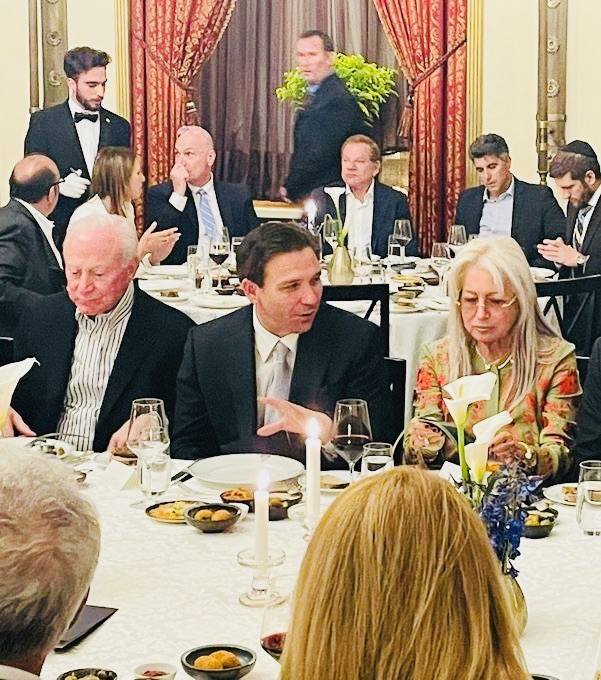
Apart from conferring with Netanyahu and Herzog, DeSantis delivered a speech at the Museum of Tolerance, where he dined with Miriam Adelson, the wife of the late casino mogul Sheldon Adelson, a major Republican donor.
As expected, McCarthy and DeSantis showered Israel with compliments, thereby underscoring their belief that the Republican Party values the United States’ multifaceted bonds with Israel and intends to strengthen them in the years ahead.
